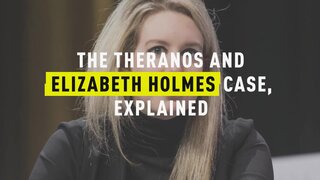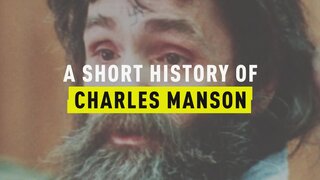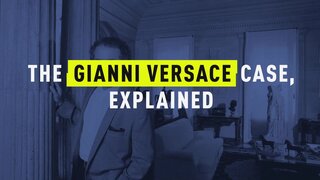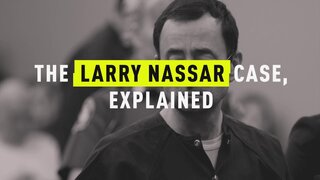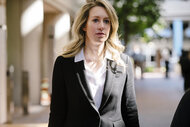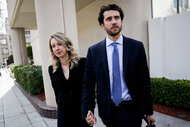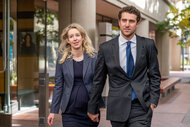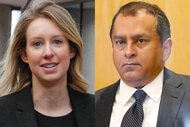Who Are Tyler And George Shultz In HBO’s Elizabeth Holmes Documentary 'The Inventor?'
The whistleblower and his grandfather, former Secretary of State George Shultz, had a falling out over the implosion of the multibillion-dollar health technology company.
HBO’s “The Inventor” documents the rollercoaster rise and fall of health technology startup Theranos and the downfall of its eccentric founder,“self-made billionaire” and university dropout Elizabeth Holmes.
The scandalous two-hour documentary, directed by Alex Gibney, “The Inventor” provides a cringe-worthy look at Holmes, the young, ambitious healthcare innovator and entrepreneur who defrauded regulators, investors, and everyday Americans—but who at one-time was touted “the next Steve Jobs.” The film chronicles how Theranos, at one-time valued more than $9 billion, was eventually cited for “massive fraud” by the SEC for lying about its so-called revolutionary blood testing technology.
But who were the whistleblowers that brought the company to its knees?
Tyler Shultz, a scientist, biotech researcher, and then recent Stanford University graduate was one of them. He's also the grandson of former secretary of state and Theranos board member George Shultz, who, along with Senator Dianne Feinstein, first introduced him to Holmes.
It was 2013 and Shultz was bright-eyed, optimistic, and was instantly seduced by Holmes.
“Everyone almost worshipped the ground [Holmes] walked on,” Shultz told HBO. “She could do no wrong. She was the next Steve Jobs. Theranos was changing the world.”
Shultz jumped at the opportunity to intern at Theranos, where he was convinced Holmes’ work was going to save the lives of millions.
Holmes, at the time, was insulating herself with rich, powerful, older men with serious political clout. She was "chummy" with former vice president Joe Biden and the Obama administration. And Theranos' board members included people like former secretary of defense James Mattis, former secretary of state Henry Kissinger, and Shultz’s grandfather. The elder Shultz, a World War II veteran, who served President Ronald Reagan as secretary of state between 1982 and 1989, and known for his Soviet-era diplomacy, was particularly charmed by Holmes, who began attending holidays and other special occasions with the Shultz family.
But the younger Shultz’s relationship with Theranos soured quickly. The Stanford graduate noticed things at the company weren’t adding up. Theranos was fudging the test results from the bloodwork processed by its then so-called miracle machine, the Edison, essentially a mini, self-automated laboratory in a box, which promised swift results for hundreds of different medical tests from a single drop of blood.
“If a hundred people who had syphilis came and got tested on the Theranos devices, we would only tell 65 of them that they had syphilis and we would tell the other 35, ‘you’re healthy, no need for medical intervention,’” Shultz told HBO.
“So if people are testing themselves for syphilis using Theranos, there’s going to be a lot more syphilis in this world.”
Shultz explained in “The Inventor” that some members of his lab at Theranos even had to phone patients and inform them that they should go to the emergency room because the results were so askew.
“I was kind of blown away,” he added.
After months of working at Theranos, Shultz directly complained to Holmes that the lab results were being doctored. But she ignored him.
“I really think that there were two entirely different worlds,” Shultz said. “There was the carpeted world and there was the tiled world. In the carpeted world where Elizabeth was a goddess. And then you go onto the tiled side and nothing works. We’re on a sinking ship. Everything is a lie. Reconciling the differences between those two worlds was really hard for me to do.”
But Shultz said that because of his family connections to Holmes, and her magnetic personality, he trusted her.
“I would leave the tiled world thinking, ‘Oh man, sinking ship,’” he added. “And I would go have one conversation with Elizabeth. And I would be so motivated to go back and work and I felt like I was changing the world again. And I would go back into the tiled world and I would go, ‘wait, what just happened? You want it to be true so badly.”
Shortly after, Shultz resigned. He then spilled the beans to his grandfather, who rejected that Theranos was doing anything fraudulent.
“He said, ‘Elizabeth has told me that Theranos really can do all the things that it says it can do,” Shultz said his grandfather told him. “[They’re] going to change the world. They’re trying to convince me that you’re stupid. They can’t convince me that you’re stupid, but they can convince me that you’re wrong. And I do think that you’re wrong, so move on with your life.’”
Then, he began corresponding with Wall Street Journal reporter John Carreyrou, whose article later blew the story wide open. Shultz made it clear to the journalist he intended to clear his grandfather’s name in the story.
“Once he becomes aware of the fraud that’s happening, he will do everything he can to make things right,” he recalls thinking. “And I want to give him that opportunity because, I think he was like 94, or 95 at the time.”
But the former diplomat was unyielding in his support for Holmes. And that’s when the younger Shultz’s real troubles began—and when his relationship with his grandfather severely spiraled.
“That’s when lawyers became a really big part of my life,” he said.
Shultz had signed non-disclosure and confidentiality agreements and Theranos legal team began threatening him to stay quiet. In the end, he said his family would up spending between $400,000 and $500,000 on legal fees.
“They were threatening to sue me for violating my nondisclosure agreement, for giving up trade secrets,” Shultz said. “It was getting to the point where we needed to find money somewhere so they said that they would sell their house to keep fighting this legal battle.”
At this point, Shultz’s grandfather intervened, and brokered a meeting between Theranos’ attorneys and his grandson. But the meeting didn’t go as planned.
“They really made me feel like I was alone,” Shultz said. “I was the underdog. I was going to get crushed.”
The meeting got heated and Shultz said his grandfather had to “physically separate” him and the lawyers.
“I wouldn’t call them attorneys,” recounted the elder Shultz in archival footage from 2017 used in the HBO documentary. “The man was some sort of an animal, wild animal, and he assaulted my grandson. Was one of the dumbest things I’ve ever observed. Verbally, verbally, he just went after him. If it hadn’t ended when it ended, my wife was about to pick an iron out, hand iron right out of the fireplace and clobber him.”
Yet, the meeting left Shultz’s grandfather unmoved.
“My grandfather seemed like had had grown, that his allegiance to Elizabeth and Theranos, had grown even stronger.”
But since Theranos’ collapse, and the undoing of Holmes, the grandfather-grandson pair have since resolved their differences.
“He said he had no idea how much deception there was, and that he was proud of me,” Shultz said. “I’m glad he finally really gets it.”
Shultz's grandfather resigned from Theranos' board before the company went under in 2018. He's 98.
At the time of the company's dissolution, it owed more than $60 million to creditors, according to USA Today. Holmes was indicted of conspiracy two counts of conspiracy commit wire fraud and nine counts of wire fraud. If convicted, she could face up to 20 years in prison. Holmes is scheduled to appear in court for a status hearing in San Francisco on April 22, according to Elle.
Schultz recently told Refinery29 he's proud he spoke out — even if Holmes hasn't been held accountable yet in court.
“The legal system works slowly," he said. "It's not over.”
